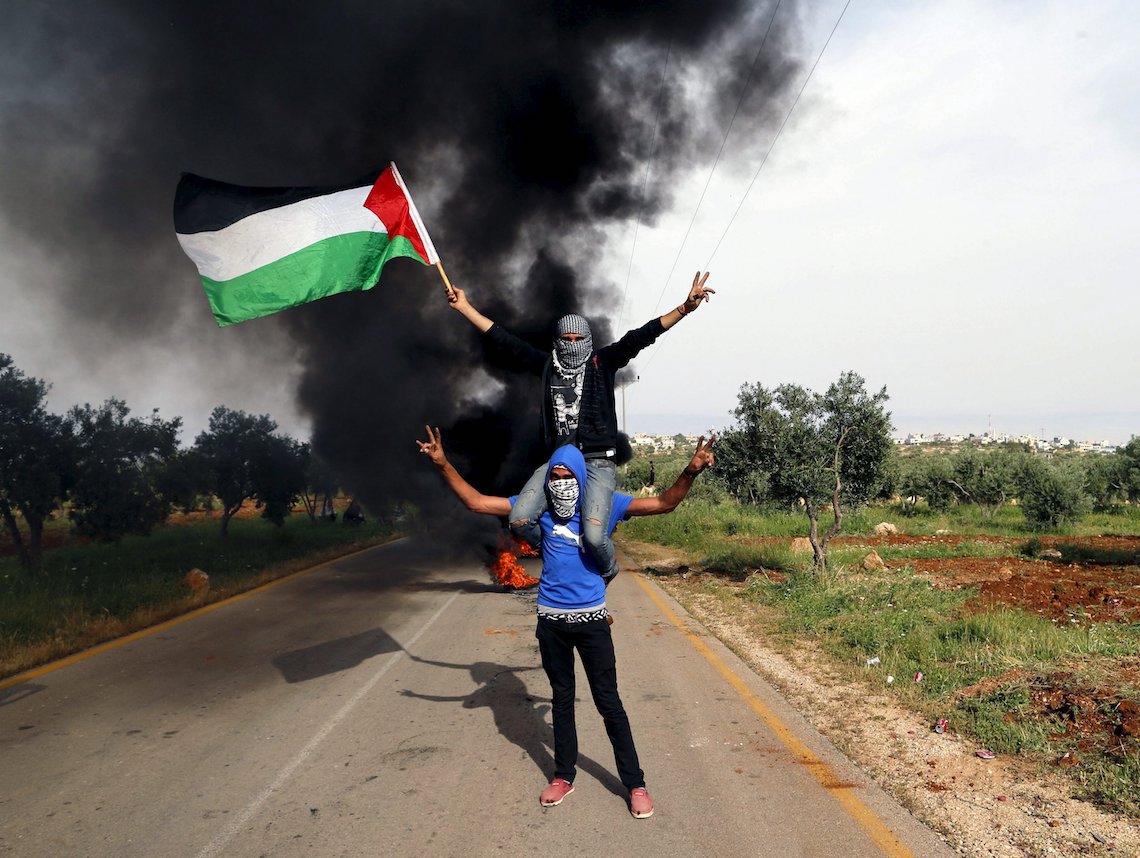 A Palestinian protester waves a Palestinian flag during clashes with Israeli troops in the West Bank on April 5, 2016. Photo by Ammar Awad/Reuters
A Palestinian protester waves a Palestinian flag during clashes with Israeli troops in the West Bank on April 5, 2016. Photo by Ammar Awad/Reuters Joshua Malina wants to shut Jews up by shaming them.
Referring to the negative reaction among some Jews to raising a Palestinian flag at a Jewish summer camp, he writes in the Journal: “I believe this group reaction to what took place is a shame on our community.”
In other words, if you don’t agree with Malina, then shame on you. But since when is the freedom to dissent a mark of shame? Whatever happened to that great Jewish value of debate and looking at both sides of an issue?
Malina’s beef refers to Camp Solomon Schechter in Washington, which raised the Palestinian flag to welcome a delegation of Palestinian youth visiting under Kids4Peace, an Israeli group dedicated to “ending conflict and inspiring hope in Jerusalem and other divided societies around the world.”
What upset Malina is that the camp eventually took down the flag and apologized: “The predictable collective howl of disgust from the Jewish community led to an email of explanation from the camp to parents, followed soon after by an official statement of apology. And with that, an attempt at outreach had been eclipsed by an instinctive negative Jewish response to a controversial symbol.”
I guess Malina forgot how things work in the Jewish community. We have big mouths. When things upset us, we speak up. We hold our leaders accountable. We argue. We don’t hold back.
But when we say “shame on you for disagreeing with me,” that’s when we leave the debate. That’s when we go running into our silos of self-righteousness and wallow in the only view that counts– our own.
Had Malina reached out to some of those who disagree with him — instead of dismissing them as “collective howlers” — he might have heard some smart thinking about symbols and why the Palestinian flag is such a “controversial” one.
He might have heard that the Palestinian flag has been used to represent the annihilation of Israel and the glorifying of terrorism. That’s more than controversy.
He might have heard that the beauty of groups like Kids4Peace is that they can transcend nationalist dogmas and reconnect us to our shared humanity. A flag that is associated with the vanishing of Israel doesn’t reconnect us to our shared humanity.
He might have heard that the flag is just one of many symbols permeating Palestinian society that has instilled divisiveness. There is also the ubiquitous map of Palestine that conquers all of Israel, the large keys to houses from pre-1948 Israel, the posters of martyrs who murdered Israelis, and so on. Such symbols don’t unite, they divide.
If you want to welcome Palestinian kids to a Jewish summer camp, you don’t need symbols, you need real stuff like great food, great music and great activities. If you insist on raising a flag, then raise a flag of humanity called Peace. That’s called a safe space.
Now, you can disagree with all that, and we can respect our disagreement, but don’t try to shame me for having a different view.
Malina bemoans the fact that the flag saga covered up the real story of how Palestinian and Jewish kids came together at a summer camp and made connections. He writes: “Everyone is so caught up in an emotional argument about a piece of cloth that the real story is utterly obscured.”
What he misses is that, sadly, the flag saga is the real story of the failure of peace in the Middle East. Peace has failed not because there aren’t enough groups like Kids4Peace. From the Palestinian side, it has failed, in many ways, precisely because power symbols like flags on mosques and keys in homes and martyr posters on streets and triumphalist maps in schools and anti-Jewish cartoons in the media have dominated Palestinian consciousness and suffocated any real human connection with the other side.
Flags don’t make human connections, people do.
Malina ends his piece by hoping that this story will provide a teachable moment for the Jewish community. I couldn’t agree more.
David Suissa is president of TRIBE Media Corp./Jewish Journal and can be reached at davids@jewishjournal.com.






















 More news and opinions than at a Shabbat dinner, right in your inbox.
More news and opinions than at a Shabbat dinner, right in your inbox.